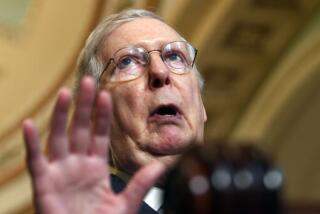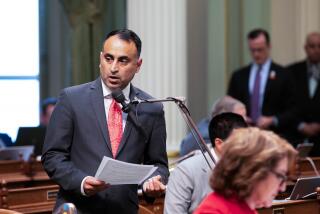Rostenkowski Warns of Health Plan Tax Hike
- Share via
WASHINGTON — Rep. Dan Rostenkowski (D-Ill.) said Friday that a broad-based tax increase may be needed to meet President Clinton’s goal of assuring medical coverage for every American--a financing option that Clinton sought to avoid for fear it would dampen public support for health care reform.
Rostenkowski, chairman of the House Ways and Means Committee, said the basic approach of the Clinton health care plan--increasing competition in the medical marketplace--ultimately would bring costs under better control. But “that doesn’t happen until later,” he said in a speech to the Harvard School of Public Health in Boston.
“My best guess is that we will need tens of billions of dollars annually by the turn of the century. . . . So there’s ample reason to wonder whether a broad tax increase will be required that has some impact on virtually every American,” he said.
Rostenkowski did not elaborate on the specific tax he thought would be necessary, except to say that “the time isn’t right” for a value-added tax, a form of sales tax used in other countries.
Yet his comments underscored a growing realization on Capitol Hill that health care reform cannot be as painless as Clinton has portrayed it.
“We do have a truth-in-legislating standard to meet, and that requires me to remind you that we still haven’t found the health fairy, and we’re not terribly optimistic that we will,” Rostenkowski said.
The Congressional Budget Office has undercut arguments by the Administration and others that the more-competitive health care market they envision can generate almost enough savings to finance universal coverage. Many lawmakers also are leery of the Clinton proposal to rein in health care costs through government price controls.
“My sense is that the American people are sophisticated enough to realize that you only get what you pay for. And if you want more, you have to pay more,” Rostenkowski said. “The question now is not whether people are willing to make this contribution--because it is clear to me that they are--but rather, what the fairest way to structure it will be.”
Clinton, asked at a news conference about Rostenkowski’s comments, said: “I think Mr. Rostenkowski is trying to achieve our common objectives, which he defined as universal coverage, cost control and 218 votes (a majority in the House). And I think he has a strategy for pursuing that.”
Still, Clinton said, “we’ve worked very hard on the numbers. We think they are good.”
Rostenkowski also said he thought the idea of expanding Medicare to cover those who do not get adequate coverage through an employer--a concept embraced by his panel’s health subcommittee--was “a good one.” He noted that Medicare has a good record of holding down costs, and that senior citizens are more satisfied than other Americans with the quality of the health care they get.
More to Read
Get the L.A. Times Politics newsletter
Deeply reported insights into legislation, politics and policy from Sacramento, Washington and beyond. In your inbox twice per week.
You may occasionally receive promotional content from the Los Angeles Times.









